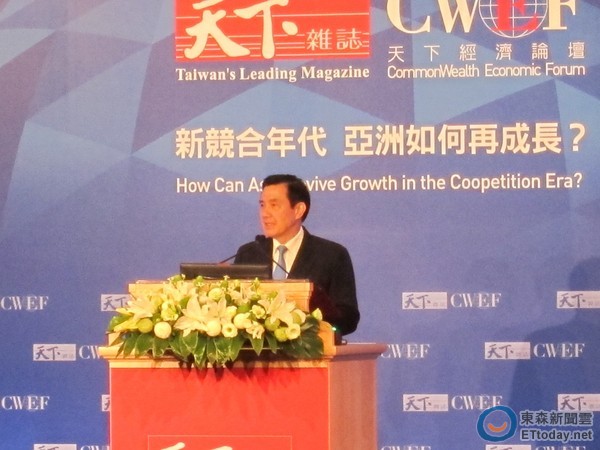by Billy Lin
語言:
English ///中文
Translation: Aaron Wytze Wilson
Photo Credit: Liberty Times
Recently, President Ma Ying-jeou has made a number of erroneous statements about open data, claiming that Taiwan’s number-one ranking on the Open Knowledge Foundation’s open data index is proof of his administration’s overall transparency. In response, Billy Lin (林雨蒼), a prominent member of the civic-tech community “g0v” wrote an editorial response to Taiwan’s Apple Daily editorial board. We have translated the original editorial with the author’s permission.
IN DECEMBER 2015, the United Kingdom’s Open Knowledge Foundation compared and assessed the open data policies of 149 countries, and placed Taiwan at number one, demonstrating that the government’s approach to open data has received international approval.
However, President Ma Ying-jeou (馬英九) of the ruling Nationalist Party (KMT) has misunderstood the meaning of open data, and has on multiple occasions used this data to counter criticism that his administration is heavily engaged in “blackbox politics” (黑箱), a term used in Taiwan to denote heavy reliance on shady backroom political dealings.
Even during President Ma’s opening remarks at Commonwealth Magazine’s annual economic forum on January 21st, he claimed, “Taiwan’s opposition party often criticizes our government for engaging in blackbox politics, but they never expected the level of our transparency would be ranked number one worldwide.”
 Ma Ying-Jeou at Commonwealth Magazine’s annual economic forum on January 21st. Photo credit: 楊佳穎/ETToday
Ma Ying-Jeou at Commonwealth Magazine’s annual economic forum on January 21st. Photo credit: 楊佳穎/ETToday
I’m afraid this kind of talk only proves that President Ma not only has misunderstood the meaning of “open data”, but also misunderstood why the public has criticized his government for engaging in non-transparent political dealings.
“Open data”refers to public government offices providing various kinds of first-hand data produced during the process of administration, in an available format that can be easily processed by computers, and is easily accessible to the general populace. With open data, we can induce transparent government administration and inter-government data circulation; we can also strengthen the ability of the public to monitor the government.
It could be said that open data is a prerequisite to increase government transparency, but merely having open data certainly does not mean that the government does not resort to shady backroom dealings. The public’s criticism of the Ma administration engaging in “blackbox politics” is not because the government does not want to release data to the public.
 Sunflower Movement occupation of the Legislative Yuan which took place in demonstration of Ma Ying-Jeou forcing through the CSSTA trade agreement signed with China. Photo credit: Liberty Times
Sunflower Movement occupation of the Legislative Yuan which took place in demonstration of Ma Ying-Jeou forcing through the CSSTA trade agreement signed with China. Photo credit: Liberty Times
Let’s use the signing of the Cross-Strait Service and Trade Agreement (CSSTA) as an example. Before the government signed the agreement, it did not publish any details of the negotiations to the public, nor did it consult with any related industry professionals in Taiwan to understand the potential losses or gains from such a deal. Furthermore, it did not conduct any evaluations to learn about the potential risks of the CSSTA.
After the signing, there were a number of public hearings, but they did not heed any of the publics advice, nor did they revise the initial content of the agreement. The government even attempted to pass the bill as a memorandum in order to evade supervision controls from Taiwan’s Legislative Yuan.
Let’s use the “Ma-Xi summit” as another example. President Ma only released news of the meeting five days before it was to take place. Ma said he was willing to go to the Legislative Yuan to make a full report to the opposition, but this is not enough time with regards to public supervision of the meeting, making the details of the event extremely difficult to monitor. The public was essentially unable to learn from Ma what the contents of the meeting with China would be.
This goes against the popular will of the people, shirks supervision, and is foolhardy behaviour for a president. This is the major reason why the public has criticized Ma for his non-transparent approach to government rule.
Certainly, Premier Mao Chi-kuo’s (毛治國) administration has carried out a corresponding degree of effort in doing away with opaque government dealings. Minister to the Executive Yuan, Jaclyn Tsai (蔡玉玲), has promoted the “VTaiwan” project, a web platform that enables communication between the public and the central government on new laws pertaining to the internet. Netizens can discuss appropriate law articles with government institutions, and then hand them over to the Legislative Yuan to be passed.
These kinds of efforts can appropriately be called “public transparency”, and is appropriate behaviour from a government administration. We are hopeful that the next government administration can continue Premier Mao’s open data policies and will also implement new laws and regulations related to open-ness and transparency, including a public information law, and regular recording releases of meeting minutes. We also hope that the next administration considers public consensus when formulating new policy.
By closely looking at the definitions of both “open data” and “back room dealings”, we are able to see that President Ma Ying-jeou does not truly understand what either word means, nor has he understood the true reason why people criticize his government for being overly opaque. For him to make a statement like the one on January 21st, shows how out of tune he is with public sentiment. We sincerely recommend that Ma first understand what exactly the public is criticizing you for, and then consider how you will respond. Otherwise, these kind of absurd statements will continue to make Ma the laughingstock of experts, and cement his “bumbling” historical legacy.
BL: I would like to extend my thanks to clkao, au, Cheng Kuo-wei, pofeng, et al for their assistance in completing this article.


 Ma Ying-Jeou at Commonwealth Magazine’s annual economic forum on January 21st. Photo credit: 楊佳穎/ETToday
Ma Ying-Jeou at Commonwealth Magazine’s annual economic forum on January 21st. Photo credit: 楊佳穎/ETToday Sunflower Movement occupation of the Legislative Yuan which took place in demonstration of Ma Ying-Jeou forcing through the CSSTA trade agreement signed with China. Photo credit: Liberty Times
Sunflower Movement occupation of the Legislative Yuan which took place in demonstration of Ma Ying-Jeou forcing through the CSSTA trade agreement signed with China. Photo credit: Liberty Times